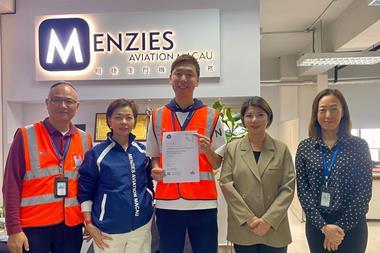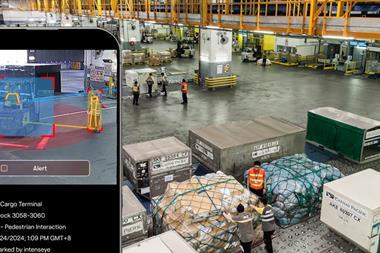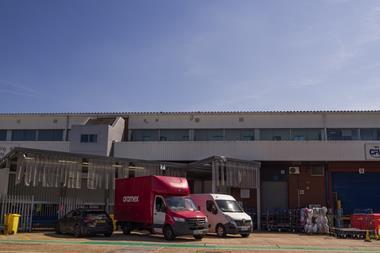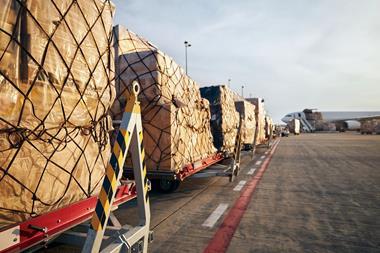
In the first article of a new column series from the Airforwarders Association, executive director Brandon Fried outlines how we can approach the latest US all-cargo screening mandate, due to come into effect in June 2021, without risking our safety.
Air cargo security is constantly evolving, and the next chapter could have a profound impact on the US shipping industry, including manufacturers, warehouses, forwarders and e-commerce fulfillment centers.
Starting in June 2021, shipments flying on international all-cargo flights will have to be screened with the same scrutiny of cargo transported on passenger planes or received from a US Transportation Security Administration (TSA)-regulated entity that has applied appropriate security controls.
TSA is currently seeking public feedback on ways to meet this mandate, including strategies that may avoid physical screening for some shipments. Still, many fear that a misstep could incite confusion and create a significant security threat.
During the coronavirus pandemic, most of us have relied on ordering goods and services online, including groceries and everyday household items.
Thanks to advancements in technology, handling methods, and a growing network of trucking and air-cargo transport options, manufacturers and the e-commerce industry continue to satisfy these unprecedented demand spikes while quickly fulfilling orders.
This trend of integrated, fast shipping should extend well beyond the crisis as consumers develop appetites for the easy and quick delivery that online ordering provides.
While some companies manufacture products in-house and ship directly to the customer, many electronic retailers act as intermediaries, accepting products in their distribution centers before selling them to consumers through online portals.
These operations generally use extensive security protocols such as employee background checks, badging and rigid facility access controls.
Commodities in these centers are protected against theft and pilferage because the integrity of the online retailing business model depends upon items being delivered both on time and intact.
In most cases, however, contents of the boxes moving through electronic retailer distribution centers and warehouses are presumed to include the indicated products without verifying the contents of each container.
This uncertainty creates vulnerability in the process and the opportunity for malicious actors to substitute a box of approved goods for one containing an improvised explosive device that could of bring harm to a freighter aircraft in flight, its crew and the people on the ground under its path.
In determining cargo screening requirements for freight transported on passenger flights, TSA initiated the highly successful supply chain-driven solution known as the Certified Cargo Screening Program (CCSP).
The CCSP allows manufacturers, retailers, and freight forwarders to perform the explosive screening task before tendering shipments to passenger airlines for transport.
The program has over 1,000 certified entities and serves as an ideal example of industry and government collaboration in assuring the safety and security of our passenger air system.
TSA realises that initiating a similar program for freighter aircraft will significantly increase the expense of transporting air cargo and could adversely affect the price of goods.
In seeking a less costly alternative, the agency is proposing another initiative to meet the June 2021 requirement that emphasises effective employee and facility security controls, as opposed to physically screening the box contents.
Unlike the passenger plane-focused CCSP, where manufacturers perform the screening during the packing process or forwarders use detection solutions to complete the task, this alternative solution would enforce government-approved security controls.
Entities participating in the proposed alternative framework would not be a ‘Regulated Agent’, which is an agent, freight forwarder, or other entity conducting business with an operator in existing security programs.
Instead, they would be termed a ‘Known Consignor’, applying security controls to cargo or mail to allow its carriage on commercial all-cargo aircraft.
Thanks to TSA’s diligence in continually improving cargo screening techniques, the agency has implemented many new technologies to support this effort, most recently including the use of privately supplied canines to perform the task.
TSA regulated and certified dog teams now screen cargo quickly and efficiently, speeding up the process while exceeding the detection levels mandated by law.
Canines are an essential part of the passenger-cargo screening arsenal used worldwide and can be an integral component in keeping freighter planes safe at US airports as well.
The TSA should be commended for considering all possible alternatives to meet the upcoming international cargo screening mandate. Still, the agency must consider the pitfalls of another program that will likely confuse the existing regulated community.
During the implementation of the CCSP, we saw that most shippers didn’t enroll in the program to avoid additional regulatory oversight and costs, and instead are relying on their supply chain partners to manage the security burden.
A new initiative will not likely attract a significant number of actual shippers. It will undoubtedly create confusion among regulated carriers in the struggle to abide by the specific training, marking and handling process requirements of similar, yet distinctly different, existing programs.
The perplexity will create delays, additional costs for the government and could result in further vulnerabilities to our safety and security.
The most efficient and straightforward solution is to mandate that identical goods moving through the export supply chain should be treated with the same security screening options — regardless of how they are sold or warehoused. Regulatory processes must remain neutral, and regulators must strive to maintain a level playing field on the screening and securing of shipments — regardless of the mode of air transport.
The CCSP is a proven success that should now be updated to include all-cargo carriers, manufacturers, and of course, the e-commerce retailing industry. And above all, governments worldwide must focus on their mandate, which is to anticipate potential threats while ensuring public safety.










